If a user turns into a customer or signs up for your newsletter, it’s a big compliment. But what you’re going to do next can make or break the entire customer relationship, so it’s worth considering not just sending a welcome email but an email that will try to highlight what first drew that user to your company.
Before hitting the submit button, you must search for the best SaaS adoption emails.
You’ve therefore landed at the right place. In this blog, you shall understand SaaS Onboarding Emails, their Examples, Templates & Best Practices for Write Them.
Contents
What is Customer Onboarding?
When a buyer purchases a product or service, the seller does not want him to regret the investment. A satisfied customer is likely to buy another product from the same company. This is where SaaS onboarding emails can help. It is a way of guiding customers on the proper use of the products or services they purchase.
An onboarding strategy is a great option if you want to improve the communication between your business and your customers. That way, it becomes easier with SaaS marketing to communicate with them and create value.
So What Does This Have to Do With Digital Marketing?
As marketing relies heavily on digital tools, channels and strategies, it is important to invest in effective, efficient, and successful communication strategies such as email marketing. Therefore, a large part of your communication strategy should be through personalized and targeted emails sent to new users. Always follow digital marketing Trends for the same.
Why Are Saas Onboarding Emails Important?
Converting visitors into customers is a long process. You need interesting content and a signup form that contains email addresses and personal information, then follow up the entire process.
If you want to retain your customer, you have to find value. You need to prove that your business is worth their time and money, so the email process is one of the first places where you can exceed their expectations.
Onboarding emails get the highest level of engagement from customers. Onboarding emails have four times the open rate and five times the click-through rate than traditional email marketing campaigns.
Let us now understand more about SaaS onboarding email examples and their best practices.
Saas Onboarding Email Templates
1. Formal Onboarding Email Template
As the name suggests, a Formal Onboarding Email Template is simple and gets forward straight to the point.
Welcome to [Name of the Company]
Hello [Name of the person],
Thank you for signing up for [Name of the company]. It’s our mission/vision to [Mission or Vision of the company].
With your new account, you will get the following-
- [Benefits]
- [Tools]
- [Customer Support]
Complete your profile and give your [Customer Preferences] so we can send you the related content and resources.
We also recommend new customers check out the following-
- [Video]
- [Blog]
Don’t hesitate to contact us in case of customer service via phone [Number], email [email address], or live chatbot.
You may also follow us on [Social media handle link] to get all the latest updates!
2. The pro-tip
Sign-ups need a bit of a nudge to get started with a new SaaS tool. The viewers may be initially overwhelmed by your interface. They may remember signing up but need a reminder of why they need your service.
Therefore you must highlight basic features and suggested steps about your software.
Hi [Name of the user],
Do you require any help to get started with [Name of the app]?
Here are some suggestions to get familiar with us (and start [benefits/ features]):
- [Feature #1, link/ resource to help]
- [Feature #1, link/ resource to help]
- [Feature #1, link/ resource to help]
Feel free to contact us if you have any questions at [contact number].
[Signature]3. Friendly Email Template
It works in a friendly way and communicates with the customer in an informal or friendly way.
Welcome, [User Name]
Hello [First name],
Thank you for purchasing from [Name of the Company]! We are happy to see you here!
We have created [Product name] to help people [Mission/Vision of company], and we are thankful that you have chosen us to help you fulfill your needs.
Over the following few weeks, we’ll mail your materials to help you commence with [Product] to assure you acquire the most out of it.
Please don’t hesitate to contact us if you have any queries.
We’re glad that you are a part of this community!
Thank you,
[Your name]4. Escalation email template
The aim of this email is to help the Customer know that you’re aware that they are frustrated and will escalate the issue as soon as possible.
This email addresses their issue and lets them know you’re working hard to resolve their problem.
Hello [Customer Name],
Thank you for providing us with those extra details. We understand that it is frustrating for you.
Here is what we could understand: [Describe the issue].
If the above-listed details are correct, the [Name of the team] will resolve your issue on a priority basis.
I will let you know about any updates we have and will get back to you as soon as the issue is fully resolved. Please reach out to me for any queries.
Thank you for being patient!
[Name]5. Subscription-Upgrade Onboarding Email Template
If you have a subscription-based company, some users may upgrade from a free version of your product or service to a premium one. They may require an email introducing them to new features of their account.
Welcome to Premium!
Hello [User Name],
Thank you for your purchase, and congratulations on your account upgrade! We’re glad to continue working with you.
With your new [Name of the company] account, you will get the following:
- [Benefits]
- [Customer Support]
- [Tools]
We advise new customers to check out the following resources for their purchased upgrade.
- [Blog Post]
- [Video]
If you have any questions, please feel free to reach out to us at [Contact Number]
Thanks,
[Your name]6. Invite to a webinar
An evergreen webinar is a great way to educate a large group of customers with a reasonably minimal lift. Your team will probably need to invite people to a webinar in the onboarding process. For this, you may see the following template-
Hi,
I’m writing to let you know about an upcoming webinar that interests you!
We’re hosting it on [date]. It will be about [subject].
Given our last conversation about [feature/need/issue], this might help you.
You may register for this webinar via [insert link].
I am hoping to see you!
Thanks!
[Name]Examples and Best Practices to Write Saas Onboarding Emails
1. Add a personal touch
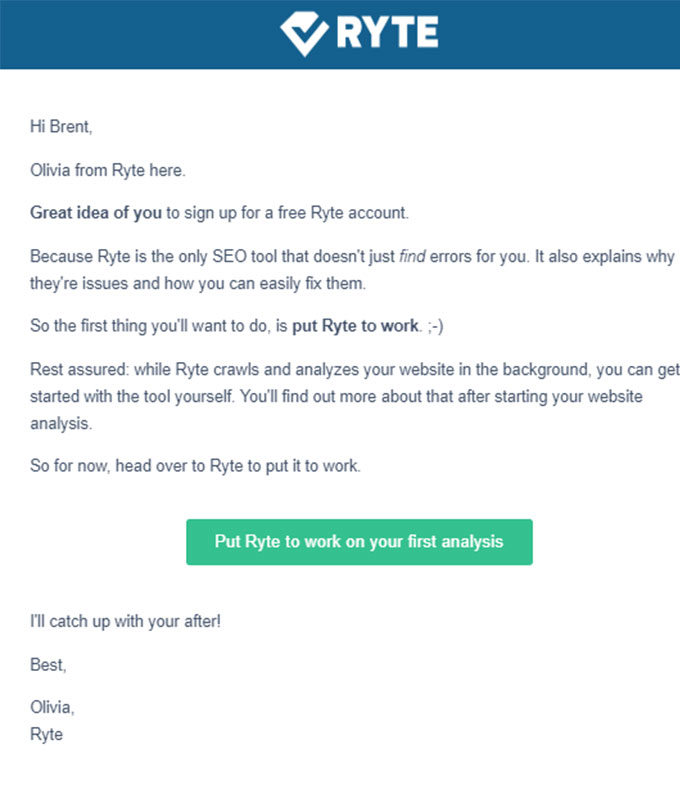
Many SaaS company emails are sent on behalf of workers rather than the company itself.
Adding a personal touch to your email is a great opportunity to connect with your customers. You can use yourself as a helping hand rather than simply presenting a sales pitch.
This onboarding email from Ryte was written by an employee, giving a personal touch to the email. Have a look at the emoji, simple and objective sentences and email signature.
2. Always start with a confirmation email
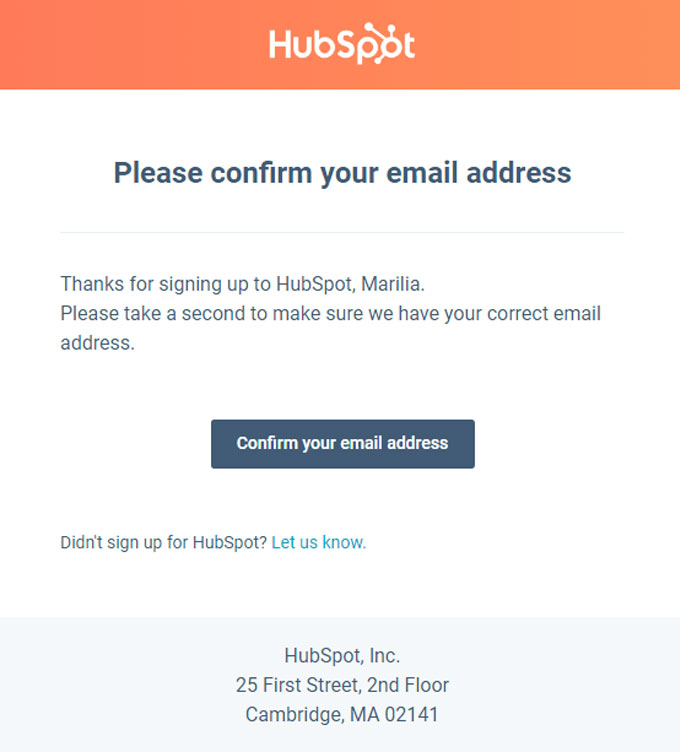
The initial step for a successful onboarding is to ensure that your subscribers are real and their email addresses are legitimate. The best way to do this is by sending a confirmation email to validate the Subscriber’s email.
There may be some people who will miss or forget to provide their information. To ensure they complete confirmation, you should send a follow-up email as a reminder.
This email confirmation from HubSpot includes all the elements to get new subscribers to verify their email addresses. The email has a touch of personalization to greet new subscribers. The email clearly explains what the user is expected to do next.
3. Keep your messages short and simple

You must have noticed that most onboarding email templates are short and simple.
It is not necessary to provide in-depth details or instructions for your sign-ups. Always provide brief details and a compelling call to action.
Always remember that you can get the job done by just providing a sentence or two, as seen in the example. Otter provides the requisite information in a simple yet smart way in just a few sentences.
4. Send a compelling welcome email
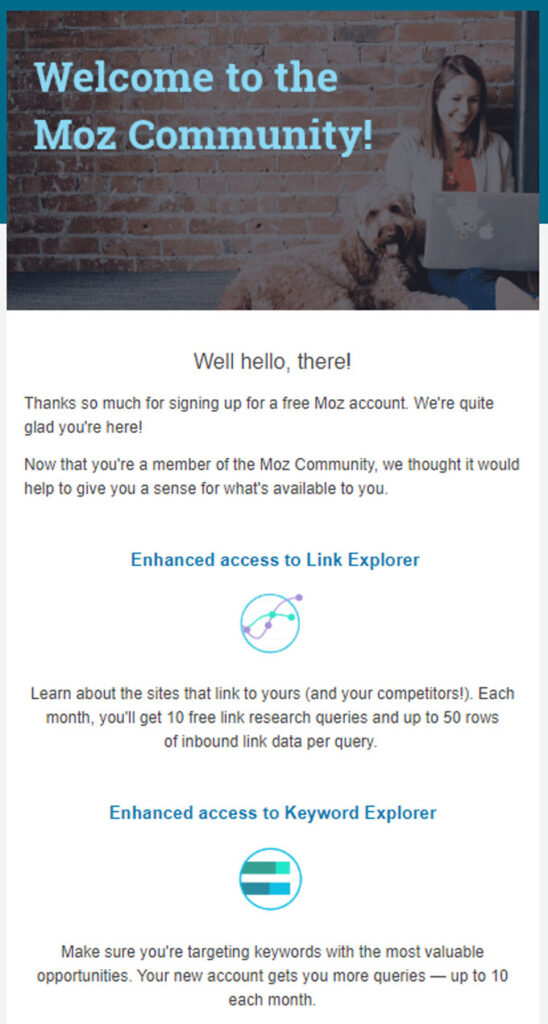
Your welcome email is the most important part of your email. It is up to you to make an important first impression on your new user. Of course, you want to attract them here and get that important first record.
Here’s a great example of a welcome from Moz, which does double duty by inviting new people to its community. At the same time, they have highlighted some of the tool’s excellent features.
This kind of email should focus on offering guidance.
5. Use Personalization
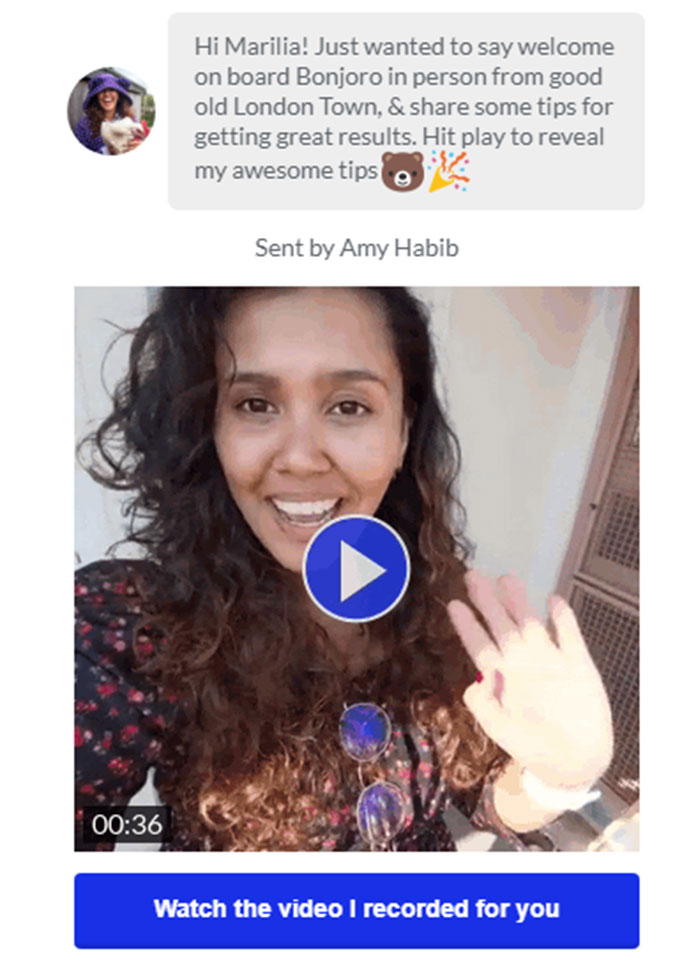
Personalization is extremely important for email engagement. You can enhance your customer experience with the help of Personalization.
However, for email personalization, you need data about subscribers. It becomes easier to customize customer experiences if you have accurate data. You can also send emails from an employee email rather than a generic one.
The above-given example of Bonjoro is a very good example of personalization. It personalizes the onboarding sequence with compelling video messages.
6. Focus your content on your call to action
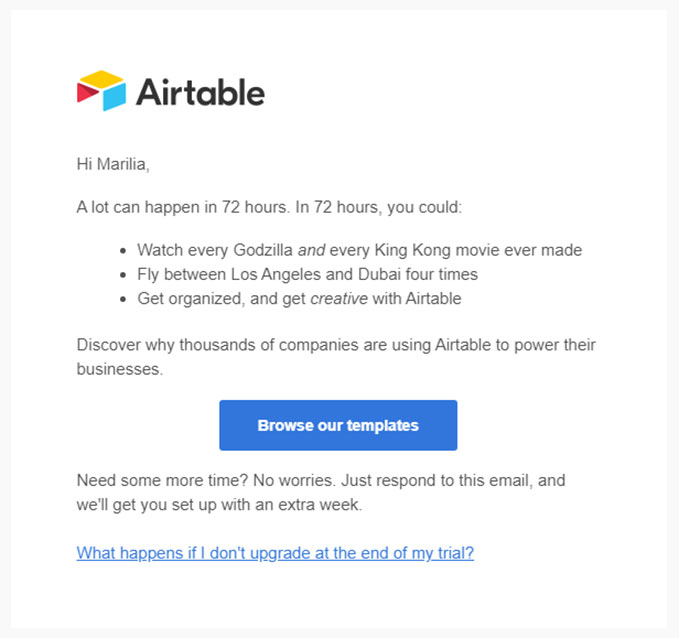
Setting goals for each engagement email will help you achieve higher bounce rates. However, it is very important to have a compelling call to action.
CTAs grab your customers’ attention and motivate them to take action. To create a perfect CTA, you need to use appropriate text and images to improve its effectiveness.
To help customers see what they can do with it, emphasize the benefits of what you offer rather than the features.
This example from Airtable shows how to use strong copy with CTAs to encourage users to explore the product’s benefits. In addition, the company allows customers to contact them directly and provide information about what will happen if their policy is not renewed.
7. Test your message
Because each customer has different expectations, testing your message will allow you to deliver better content that connects more with them. One way to do this is through Split Testing, a standard test that measures open and clicks rates.
8. Avoid generic subject lines to avoid confusion
If you’re not embarrassed by your email subject lines, you should be.
It is well documented that almost half of the users only read emails in the subject line. While generic subject lines aren’t scary, they could be more persuasive. Use different and persuasive subject lines for SaaS opt-in emails that interest your users and make them want to read them further.
Wrapping Up
There’s a lot that you can do with your onboarding emails. However, these templates and tips are a good starting point for any SaaS company. By writing compelling emails that motivate readers to take action, you’re set up for long-term customers.
We hope the blog helped you get the requisite information about SaaS onboarding emails. To get help on Onboarding Emails, schedule a demo with NotifyVisitors.
FAQs
1. When should you send an onboarding email to a customer?
Your first opt-in email should be sent within a few minutes after the customer has registered or purchased the product/service. You may send automated emails but try to make it feel as personal as possible.
2. How long should the email be?
Your email should be between 60 and 130 words. Keep your welcome message as short and simple as possible. Also, whenever you add a new customer, ask for feedback so you can continually improve your process.
3. What should be the structure of an onboarding email?
The content should be short, scanned, and presented in small chunks. Recipients spend seconds skimming through emails, picking up only keywords and common topics. They will slow down and read your message more carefully if they see something relevant. Start typing your email, remove half of the words, and check the box to remove the rest.
Also Read:
- 10 Best Onboarding Emails Examples & Template
- Email Sequences: Examples and How to Create Them?
- 17 Brilliant Email Marketing Campaign Examples
- 14 Best Email Automation Tools to Try [Compared]
- 19 Best eCommerce Email Marketing Software

























 Email
Email SMS
SMS Whatsapp
Whatsapp Web Push
Web Push App Push
App Push Popups
Popups Channel A/B Testing
Channel A/B Testing  Control groups Analysis
Control groups Analysis Frequency Capping
Frequency Capping Funnel Analysis
Funnel Analysis Cohort Analysis
Cohort Analysis RFM Analysis
RFM Analysis Signup Forms
Signup Forms Surveys
Surveys NPS
NPS Landing pages personalization
Landing pages personalization  Website A/B Testing
Website A/B Testing  PWA/TWA
PWA/TWA Heatmaps
Heatmaps Session Recording
Session Recording Wix
Wix Shopify
Shopify Magento
Magento Woocommerce
Woocommerce eCommerce D2C
eCommerce D2C  Mutual Funds
Mutual Funds Insurance
Insurance Lending
Lending  Recipes
Recipes  Product Updates
Product Updates App Marketplace
App Marketplace Academy
Academy

